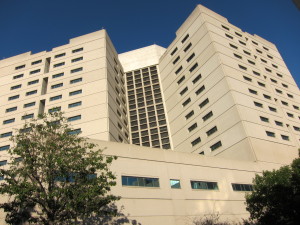By Sharon Simonson

SAN JOSE — A U.S. magistrate judge is likely to grant the pre-trial release of a Chinese professor who has been held without bail in the Santa Clara County jail, accused of espionage and trade-secret theft.
Judge Nathanael Cousins said during a June 24 detention hearing that he was inclined to allow 36-year-old Hao Zhang to leave confinement so long as the right mix of incentives and safeguards could be set in place.
Defense attorneys told the court that they could offer assets valued at roughly $500,000, including $225,000 in U.S. retirement accounts benefitting Zhang and his wife, to assure the professor would not flee in the face of the federal charges. They are also offering the equity in a Florida house owned by a Zhang relative.
Zhang would live in an electronically monitored Mountain View home with his wife as he awaited trail. The home is owned by one of the lawyers affiliated with Zhang’s defense team.
“I would be surprised if this case went to court fast,” the judge said. “There is a cost to detaining a person, and if this case goes on five years, I have to keep that in mind. Due process is at the core of why we are doing this, due process for the defendant, the victims, the government and the community.”
Zhang worked for Massachusetts-based semiconductor maker Skyworks Solutions Inc. until May 2009. Skyworks has offices in Santa Clara. He and five other Chinese citizens have been accused of stealing trade secrets from Skyworks and another semiconductor maker, Avago Technologies Ltd., which has headquarters in San Jose and Singapore, for their own benefit and that of the Chinese government.
Zhang is now a full professor at China’s Tianjin University. Wei Pang, who was also indicted but not arrested and is also a full professor at Tianjin University, worked for Avago in Colorado until mid-2009.
The federal government has sought to have Zhang held indefinitely as a flight risk.
Even before the hearing began, Zhang’s lead attorney, Thomas Nolan, tussled with Assistant U.S. Attorney Matthew Parrella over the delivery to the defense of emails that Zhang and his alleged cohorts are accused of sending. Those electronic messages, quoted at length in the federal indictment, seem to show Zhang and the others speaking openly about trade-secret theft.
“It is a lot, over 100,000 emails and smaller amounts of other stuff,” Parrella told Nolan. Many of the emails have attachments, he added. Parrella promised delivery by July 25.
But during the hearing, Nolan used the delay to boost his contention that trade-secret cases like Zhang’s often take years to resolve and that if in the end, Zhang were not convicted but had been confined to jail as he awaited trial, an injustice would have occurred.
“These cases look good at the beginning. But who creates technology? People like Dr. Zhang. Does Dr. Zhang own that, or is it owned by someone else? There is a very fine line about who is creating information, and a trade secret is about information,” Nolan told the court.
Nolan, who makes consistent reference to his battles with the U.S. attorneys in other trade-secret cases, exercises a barely concealed disdain for his adversaries, complaining to the judge that federal prosecutors do no independent verification of allegations by companies. After the hearing, Nolan’s blue dress shirt was wet with perspiration from his exertions to defend his client.
Judge Cousins also peppered Parrella with queries about the emails and timing, asking about the language used and when Parrella thought the case would be ready to go to trial. Zhang and his co-defendants used English and Chinese in their messages, the prosecutor said. “Given the amount of legal talent on the defense side, they should be able to process this quickly,” Parrella told the judge.
“More depth than the Golden State Warriors,” the judge responded.
Zhang is being represented by at least five attorneys affiliated with two firms: Nolan and Daniel Olmos of Palo Alto law firm Nolan Barton Bradford Olmos LLP and Michael Brown, William “Mitch” Mitchelson Jr. and Yitai Hu of Alston & Bird LLP. He also has a team of immigration lawyers, Nolan told the court.
In addition to the criminal charges against him, Zhang faces the revocation of his federal visa and expulsion from the country by the Department of Homeland Security, an issue that complicates his release from jail.
Tianjin University is financing Zhang’s legal costs and other expenses, according to a translation of a statement from the university published May 22 in The New York Times. In the same statement, the university defended Zhang’s integrity and its own.
Cousins directed defense attorneys to prepare an order for his signature with the proposed release conditions enumerated and to file it by June 26. He continued the hearing until 1:30 p.m. June 30, when attorneys are expected to return to court.
Federal agents arrested Zhang on May 16 at the Los Angeles International Airport as he arrived from China en route to a professional conference in Phoenix, Arizona. He was traveling with his wife on a U.S. tourist visa. At the urging of federal prosecutors, a Los Angeles federal magistrate judge ordered him held without bail and transported to San Jose to face the charges.
(Photos by Sharon Simonson)
Hi there, all the time i used to check web site
posts here early in the break of day, since i enjoy to learn more and
more.